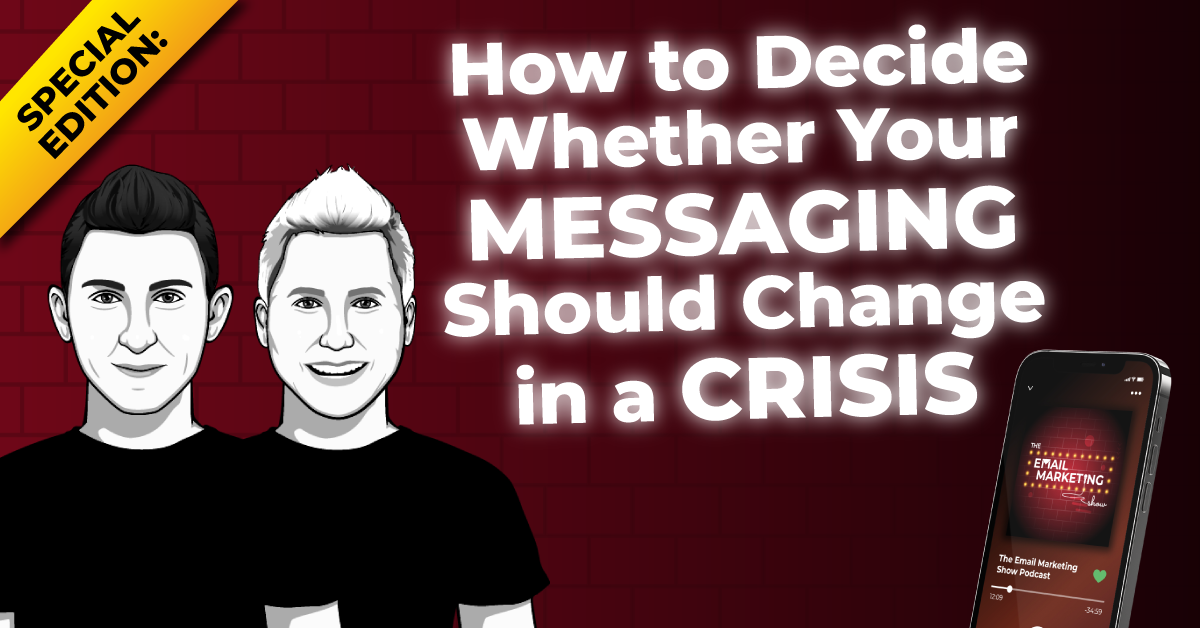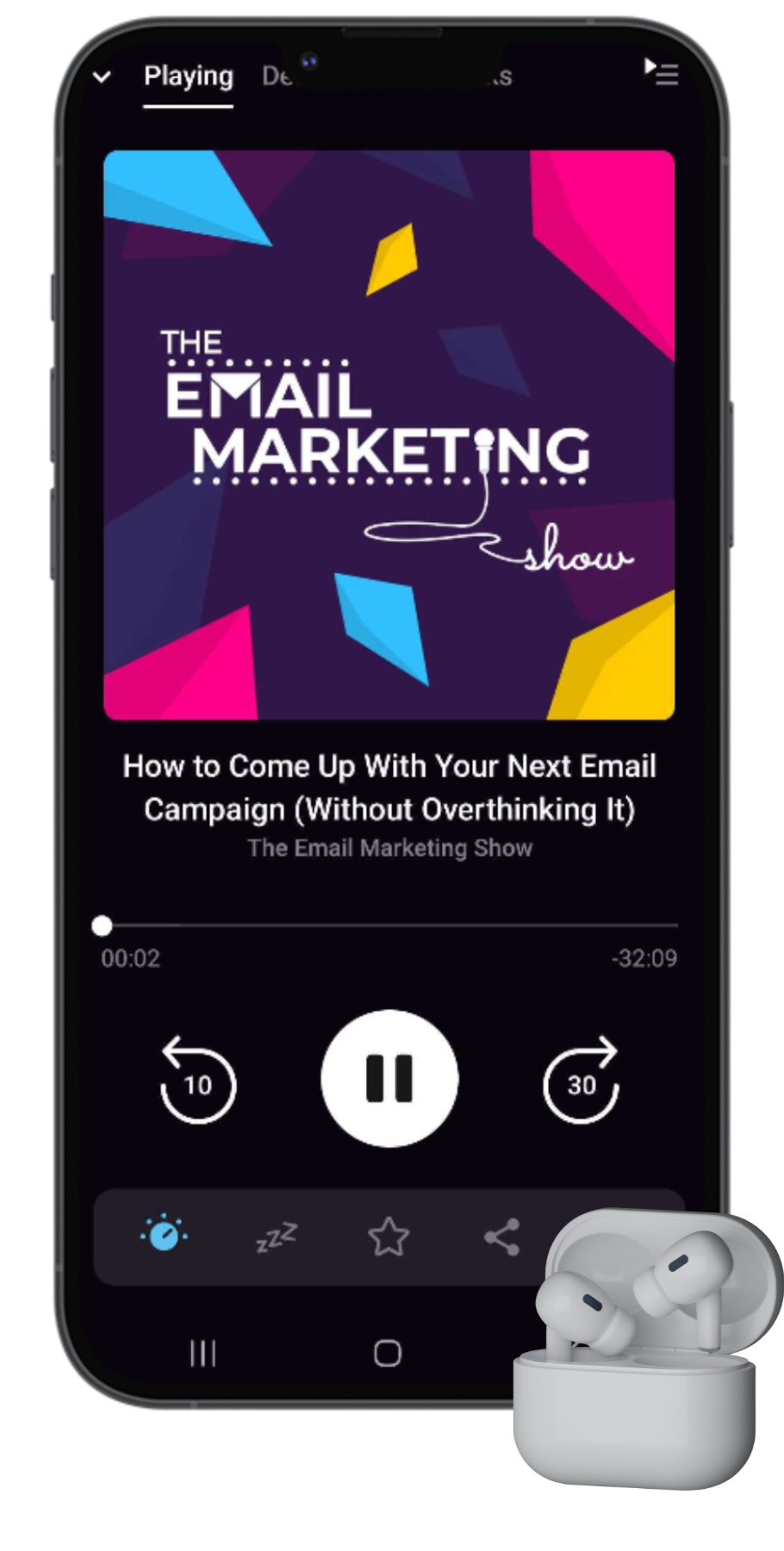
How To Decide Whether Your Messaging Should Change in a Crisis
In today's special episode, we want to share some strategic-thinking processes to help you decide whether your messaging should change in a crisis. When something big happens in the world, and it affects everyone on a large scale, it can seem like everyone has a strong opinion on it. So how can we make the decision about what to change? And should we, at all?
There's no right or wrong here. This isn't about us telling you what you should or shouldn't do. It's not even about us telling you what we think you should do. It's simply to help you decide what's right for you, your personality, your business, and your customers. It’s about helping you have more information to make the decision. Because the choice is yours, and so it should be!
SOME EPISODE HIGHLIGHTS: (x:xx) The two types of content you can share in a crisis. (x:xx) Does what's going on affect you? (x:xx) Does the crisis affect what you teach and what you sell? (x:xx) Does it affect your audience? (x:xx) Do you have anything to say?
The two types of content you can share in a crisis
We think there are two different types of content you can choose from when it comes to your email list or your social content. These are:
- Supportive content. This could be something as small or simple as putting up the flag of the country, an image or a video, or sharing information. It’s content in support of the cause.
- Escape content. In a time of trauma, or when things can be difficult for people, we all need some sort of escapism to support our mental health or our family's health to allow us to carry on. That escape is something your brain needs, in order to have some recovery time. So escape content is any type of content that allows people to think about something different – to give their minds a rest.
And the great news is that you can change which type of content you share as time goes on or as things unfold, your learning progresses, and you gain more knowledge. You can switch things around or mix your content up based on what feels right at any given moment. So if you're wondering whether your messaging should change in a crisis, this is something to bear in mind.
Kennedy, for example, has a strong background in entertainment, so he’s much more inclined to provide content that helps people escape. When people go and see him live, he makes them laugh – he helps them relax and recharge so they’re more equipped to make the hard decisions that need making in their own life or business. Providing escape content taps into his natural ability. But this particular piece of content you're reading, for example, is one that allows us to support our audience.
So to help you decide what to do, how your messaging should change in a crisis (if at all), and what type of content to share, we put together some questions for you to consider.
Questions to help you decide whether your messaging should change in a crisis
1. Does what’s going on affect you?
Of course, any type of crisis will affect us all – mentally and emotionally, if not physically. Are you and your audience lucky enough to be somewhere out of conflict? Or is this having a direct impact on your life?
This is where you have the opportunity to choose whether you want to shine a light onto the people who are being affected or whether you want to continue to provide that escape. Because as this situation unfolds, there are still people who will be going to the theatre to watch a comedian who'll make them belly laugh. There are still people who are going to the cinema and watching films. That's all still happening – the world doesn't pause.
Decide how to use your platform
It's easy for us to think that because we have an audience online and a platform (whether that’s your social media audience or your email list, for example) we have a moral right to use that platform in some way when something like this occurs.
But it's important to be careful. The fact you’ve built a platform only means you’re good at harvesting an audience – at running ads and getting people to opt-in for something of value, or posting content that encourages people to follow you on social media, for example. It doesn’t mean you suddenly have to turn into a politician!
We've all built an audience (large or small) around the thing we’re passionate about and are experts in. That doesn’t mean you need to be an expert in politics if that’s not what you do. We certainly aren’t, and no one should expect you to be one either.
People aren’t coming to your Instagram to get the latest breaking news about a crisis. So remember that the pressure is off – you don’t have to have the answers. You don't have to be the leader of the voice. You can decide to show support if you want to, or you can continue to be the escape.
Do you want to bring this crisis into your content?
Once you’ve worked out if the crisis affects you, you need to decide whether you want to bring it into your content or not. This will help you decide if and how your messaging should change in a crisis.
If it affects you directly, you might not want to bring it into your content. And that’s a choice you have. Just because something’s directly affecting you, it doesn’t mean you have to talk about it. Because you might not feel it’s appropriate when it’s a part of you. You have the choice of what you share.
There are things about our lives that we don’t talk about – personal things that we decide to create a boundary around. And you get to make that choice about your own content.
2. Does the crisis affect what you teach and what you sell?
The second question that could help you decide whether your messaging should change in a crisis is whether the situation affects what you teach and sell.
It might impact the content you teach, the way you teach it, the frameworks you use, or the things you share. If the crisis affects any of these aspects of your business, think about whether you want to share content about it because of how it impacts you. And if not, that’s totally fine.
3. Does it affect your audience?
In order to understand whether the crisis is affecting your audience, you might need to take a deep dive into where they are based. One of the things we talk about a lot is gathering as much data as possible on your audience – in the nicest possible way, of course. If you know where your audience is based, and there’s a particular part of the world that’s affected, then you can identify these subscribers on your list, for example.
And then you have a choice. If you want, you can segment them out of your marketing completely. Truthfully, what you’re offering right now might not be as important to them as what's going on in their life. So by taking them out of your marketing, you are actually supporting them.
If your entire audience is in that part of the world, you might choose the support route, rather than the escape route. But if you only have a subsection of your audience in the affected areas, you might find that everyone else may not want to see content about what’s going on in the world.
Sure, they want to be kept abreast of the information. But there are dedicated channels (such as the news) where that happens. They’re not looking for that kind of information in the email list where they signed up to learn how to play the piano or how to do baby yoga, for example. So for these people, the escape mechanism might be more appropriate. They still need these other products or services, and someone has to provide them.
So when trying to decide whether your messaging should change in a crisis, think about how it affects your audience (if at all). And then decide if they need to continue on this path with you and what you’re going to do about it.
Something we're doing, for example (and we're not saying you should, too – unless you want to) is to stop charging our Ukraine-based clients for their membership. Remember, it's about making decisions based on what you know about your audience.
4. Do you have anything to say?
If you're offering your support, and you're doing this by showing that you stand with your audience, great.
But if you have something more to say, is it researched? We need to make sure anything we share is fact-checked because the last thing you want to do is add fuel to something when you haven’t done your full research. So it’s important to be careful. And fact-checking isn’t always easy, because there are many ways numbers and information can be skewed.
And if you don’t have anything in particular to say, then it’s completely okay to be the support or the escape for your audience. As we said, you can choose one route and stick with that, or switch between the two. You can sprinkle one over the other – be mainly support and every now and then, pop some escape content in there. Or be mostly escape and then do something supportive from time to time.
Be yourself while being sensitive to the situation
At the end of the day, what matters is that we are all sensitive to the situation. This doesn’t mean we have to tread on eggshells. You can still relax and be you, just like we’re doing right now. You can share how you feel (if that's your style) and equally, you don't have to share how you feel. Whatever your style is, you can show up in that.
The key thing to remember is that this is your business, your brand, and your voice, so never feel you have to share something you're not comfortable with it. If you don't understand it, if you don't think it's right, and if you don't see how it fits with what you're doing, then you don’t have to share anything.
And don’t listen too hard to anyone who says you should or shouldn’t talk about it either. With a great platform comes great responsibility. So you have to decide what the right way to handle your audience is. What’s the right thing for you to support them or allow them to escape? Remember that everyone, for the most part, is doing their best.
Think about your audience
These situations are constantly developing and changing. So it's always difficult to even process your own understanding and feelings while you’re coming to terms with what's happening. And it’s the same for your audience – their feelings are going to change and their emotions might be heightened too.
Just be careful with how you step forward and perhaps consider the questions we suggested to help you make decisions in your business. Things like, do you have to pause your launch or will you continue with it? Do you have to check your automated email campaigns to make sure you’re not accidentally saying the wrong thing? Or that you’re not pushing your audience away?
Hopefully, what we shared today will help you look at what you’re doing and make the best decisions you can make based on the information you currently have. And that's all you can do. You get to decide whether you're going to provide support or escape content for now.





